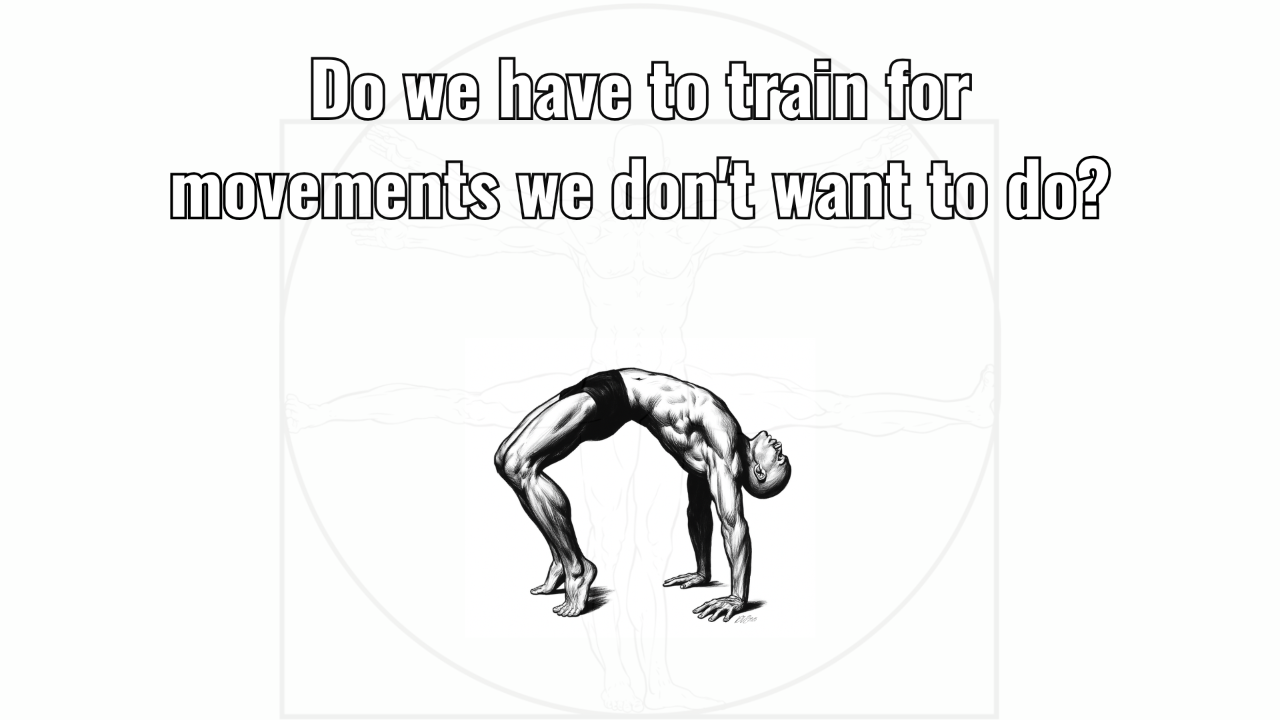
Do we have to train for movements we don't want to do?
This blog post is an answer to a question sent to my inbox. If you have a question you'd like answered, please get in touch using the Contact Form, or by sending an email to dan (at)flexibilityresearch(dot)com.
Question: I've seen a popular pole dancing coach claim that we all have to train a good backbend to be a fully functional human being. But I don't want to train backbends because I don't like doing them. Can you talk explain this? - Molly Corbett
There are three points I want to address here: 1) why people claim you need to do a particular movement, 2) whether you have to train backbends, and 3) what psychological reasons might explain why you don't want to do backbends.
Regarding point 1, people who argue for the necessity of backbends (or, indeed, any movement) usually base their reasoning on anatomy, movement theories, and subjective opinions. The same arguments tend to appear repeatedly when they feel the need to defend their viewpoint.
Spinal extension, which involves bending the spine backward as in a backbend, represents a natural movement pattern. The spine has the ability to bend forward and backward while twisting and moving from side to side. In our daily routines we tend to bend forward more frequently than other movements such as sitting down or leaning forward while looking at our phones. Many people wholeheartedly believe backbends counteract the potentially harmful effects of excessive forward movements we do during daily activities.
Another reason is related to posture. Many people who sit for extended periods develop hunched shoulders and forward-leaning heads, which backbends are purported to correct (though the evidence to support this is thin). Numerous influencers claim poor posture causes pain and health problems, although we still need much stronger evidence to support a direct causal relationship between posture, pain, and poor health.
The movement community (cult?) holds the widespread belief that full "functionality" (whatever that means) requires the ability to move all joints through their intended ranges of motion. This belief holds that you will lose movement ability if you stop training a specific movement. Several notable individuals even claim that, by extension, when the body loses its ability to execute a certain movement it indicates a malfunctioning body.
Within yoga and other somatic disciplines, backbends represent more than simple physical movements. Backbends connect with principles about "heart opening" and emotional release while enhancing bodily "energy flow." Practitioners of these techniques generally consider backbends to be essential to maintaining overall wellbeing.
The bottom line is that the importance of backbends tend to be overstated by proponents of the movement. These people fail to mention (or realise) that each body requires entirely different movements to achieve benefits that are optimal for the individual.
Regarding point 2, you do not have to train backbends. It is not a necessary movement for everyone. Good health and body function do not depend on doing every possible movement. You can be strong, flexible, free of pain, and able to move well without ever practicing a backbend. What really matters is whether the way you move suits what your daily life asks of you.
There are many other ways to keep your spine healthy that don't involve deep backbends. Working on upper back flexibility, doing general strength exercises, and being aware of your posture can help you achieve similar results. These methods support your spine and improve how you move without needing to bend deeply backwards.
Backbends are only important for certain people. If you're not a gymnast, dancer, acrobat, or involved in a sport that needs your spine to extend a lot, then doing backbends is a personal choice rather than a requirement. Just because your body can move in a certain way does not mean you must train that movement.
Finally, there are various psychological reasons why someone might choose to avoid backbends which are neither unusual nor indicative of any issues. These reasons are actually quite common. You may disregard backbends because you don't find them important. The brain might determine that a movement isn't worth your time or effort if it doesn't match your goals or personal interests. Engaging in meaningless activities could be interpreted by your brain as a waste of your energy.
Your body may retain old memories or experience discomfort which could serve as another reason. Some movements trigger memories of past experiences without your complete awareness of it. These associations can emerge from your sports or school experiences and even from the way you perceived your physical appearance. These connections remain with you even though you remain unaware of them.
There is also something called psychological resistance. When backbends are framed as mandatory exercises that must be performed, people will often instinctively resist. You may experience this reaction even if you are the one applying pressure to yourself. People naturally react this way when they perceive instructions as commands.
At the end of the day, if your sport doesn’t need you to do backbends, then you don’t need to do them. If your sport does involve backbends, like gymnastics or pole dancing, deciding whether to do them is still a personal choice that only you can make. For example, in my own martial arts training, I didn’t enjoy doing crescent kicks because I didn’t like how they looked (and I still don’t). They are useful for self-defence and for scoring points in sparring. But I just changed my fighting style to win matches without using them. It’s reasonable to think you can do the same in your own sport, whatever that is. As for the idea that avoiding backbends makes you a less functional person, that’s just nonsense.
Yours in flexibility,
Dan
